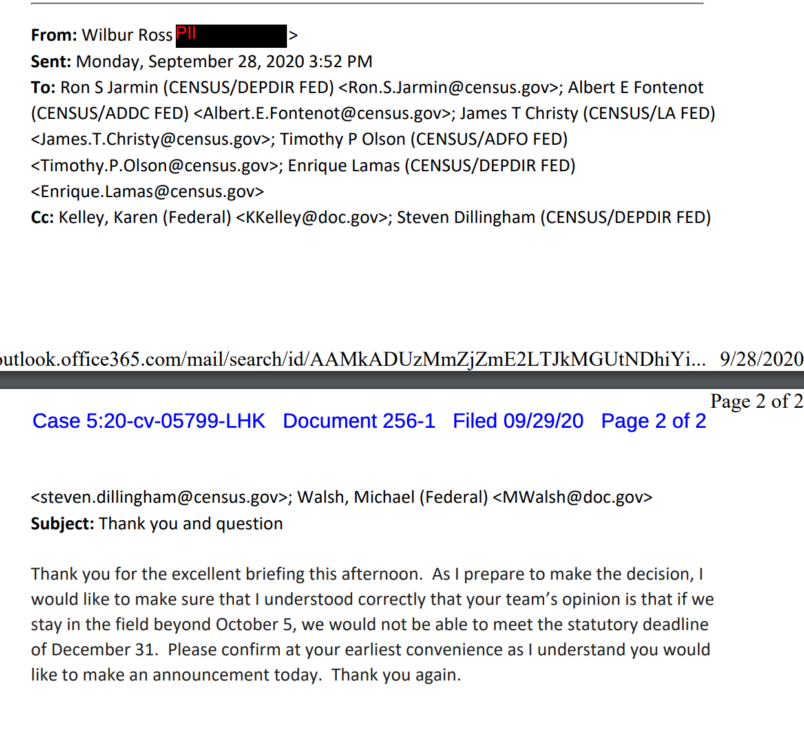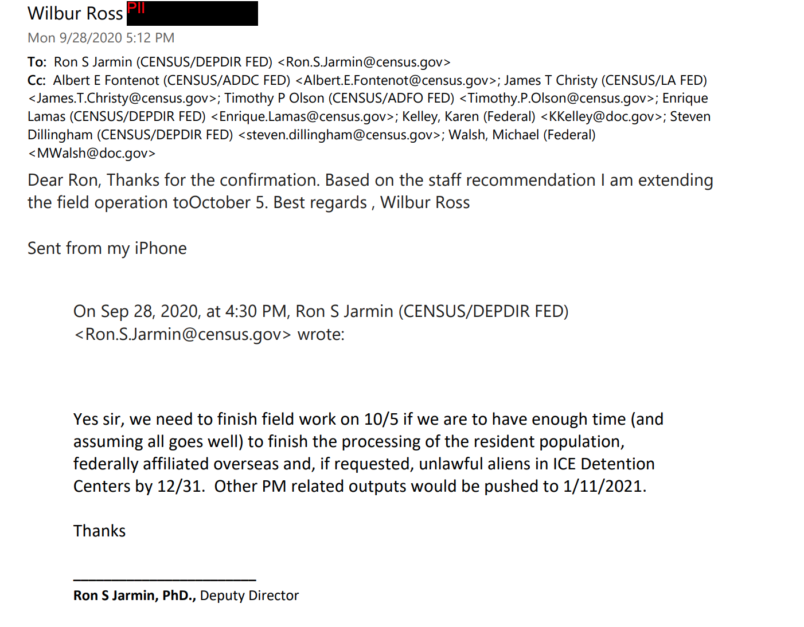The good news for President Trump is that as long as the Census Bureau cuts off counting by next week, it will have enough time to deliver to him the data he’ll need for his anti-immigrant census power grab, regardless of whether he wins in November.
The bad news for the President is the administration’s plans to cut off census counting next week is wrapped up in a very ugly and complicated legal battle.
Developments in the court cases challenging the Trump administration’s census maneuvering have laid bare the white-knuckle approach his political appointees have taken in hijacking the census for his agenda.
Trump already faces a major legal obstacle to implementing his policy, announced in July, of excluding undocumented immigrants from the census count that is used to decide how many House seats each state gets. But the risk that Trump will lose his re-election poses a very real time crunch for him to guarantee he will still be in office when the policy would, in theory, be implemented.
Apportionment data typically is delivered at the end of the year. But there is currently a fight over whether the Census Bureau should be given more time to finish the census, given the pandemic, and it appears that fight now threatens to derail Trump’s apportionment project, even before the Supreme Court gets a chance to say whether it’s legal.
Documents released in census-related litigation Tuesday night revealed that the Census Bureau believes that Oct. 5 is the latest it can wrap up its in-field counting operations and still have enough time for post-counting processing that will allow it to deliver Trump the apportionment data by the end of this year.
But a judge has already indicated that she believes doing so could be in violation of an order she imposed last week giving the Census Bureau more time to finish the count. And on Wednesday, an appeals court said that at least for the next few days, it was going to allow that order to stand.
That wasn’t the only setback Trump’s census endeavor was dealt this week: a court on Tuesday refused to put on hold its ruling earlier this month declaring the apportionment policy illegal. That ruling will remain in effect while the Supreme Court reviews the case unless the administration gets a more immediate intervention from the justices.
Back in April, when the Census Bureau said the pandemic was causing significant disruptions to its 2020 survey, the administration supported a request to Congress that it push back by four months the statutory deadlines for producing the count’s data, including the current Dec. 31 deadline for apportionment numbers.
That support mysteriously disappeared this summer, around the time Trump announced the apportionment policy and while the GOP Senate was considering its response to a House COVID-19 bill that granted the four-month census extensions. In early August, the administration indicated that instead of pressing for the extensions, it was expediting the final stages of the census’ operations so it could meet the Dec. 31 apportionment deadline after all.
The administration has denied that the decision to truncate the schedule was related to the apportionment policy. The Justice Department claims that the administration was only adjusting the schedule because of Congress hadn’t yet agreed to legislation on the extension.
But even officials within the Census Bureau see a connection between when the apportionment policy was announced and when the White House appeared to lose interest in extensions that would push off apportionment until after the inauguration.
The administration now faces legal challenges to its move to rush the census count, in addition to the lawsuits that were filed challenging the apportionment policy.
The lawsuits targeting the expedited timeline allege that speeding up the census will skew its accuracy in ways that will harm traditionally undercounted communities. The bureau’s own top experts also warned Commerce Secretary Wilbur Ross, who oversees the census, that the truncated schedule risked “serious errors” in the data’s quality.
One of those cases resulted in a preliminary order last week that blocked the truncated timeline. However, documents filed in the case since revealed that Secretary Ross directed the census to keep its counting operation on a pace that will allow it deliver the apportionment data deadline. After the bureau’s deputy director, Ron Jarmin, confirmed extending counting beyond Oct. 5 would preclude meeting the Dec. 31 deadline, Ross announced on Monday that the survey’s counting operations could continue only through that date.

A court order that certain redactions be removed from the emails also revealed that, as part of that exchange, Jarmin assured Ross that the Oct. 5 cut-off would allow the bureau to deliver by Jan. 11 the other data products needed to implement the president’s policy (often referred in shorthand as “PM” or the presidential memo).

In defending Ross’ actions to keep the census on the Dec. 31 deadline the judge had already blocked, the Justice Department argued on Tuesday night that the bureau had to plan for the possibility for the deadline to be re-imposed by a higher court. The administration had already appealed Koh’s order to the U.S. Court of Appeals for the 9th Circuit.
But that argument took a hit on Wednesday morning when the 9th Circuit denied the administration request that it put on pause Kohl’s order while the circuit court considered the appeal.
“Given the extraordinary importance of the census, it is imperative that the Bureau conduct the census in a manner that is most likely to produce a workable report in which the public can have confidence,” the court said. “The hasty and unexplained changes to the Bureau’s operations contained in the Replan, created in just 4 to 5 days, risks undermining the Bureau’s mission.”



